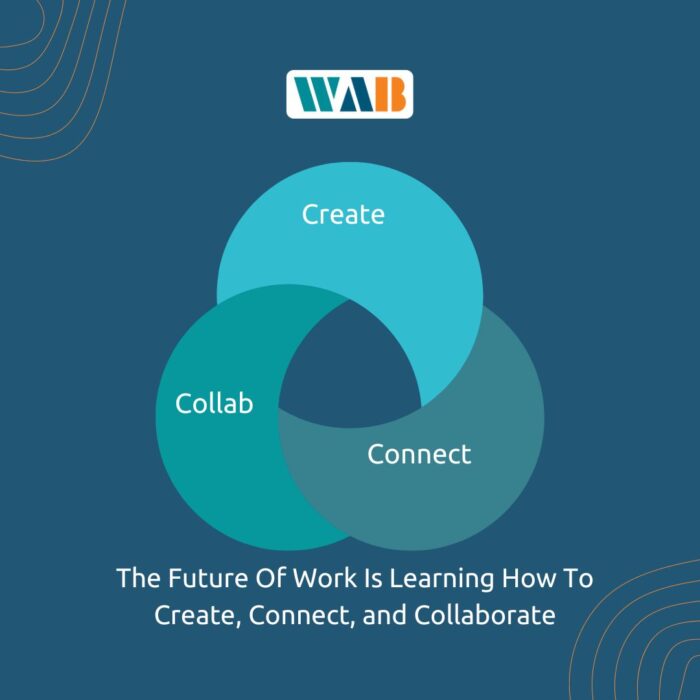Introduction
The future of work is here, and it’s not just about learning how to code. It’s about learning how to create, connect and collaborate—and how technology can help make all three easier than ever before.
Create: As automation and AI-powered technologies increasingly displace routine work, the value of our own creativity will grow.
Learning to create is the first step in the Future of Work. Creativity is what distinguishes us as humans, and as automation and AI-powered technologies increasingly replace routine work, creativity will be one of the most valuable skills you can possess.
But why is that? People use creativity to express themselves and solve problems. When you create something new or unique from scratch, you are demonstrating that you have the mental capacity to think differently than anyone else in the world. That is a significant distinction between humans and machines: machines follow instructions, whereas we use our brains!
If you want proof of this, look no further than Watson — the IBM supercomputer that uses AI technology to answer questions on Jeopardy.
To keep using our brains well into the future and to prevent being replaced by robots anytime soon, we’ll need new ways of thinking about work opportunities that go beyond being hired full-time at a company or pursuing a career path with job security until retirement age (which may never come).
Connect: Today’s digital technologies give you new ways to connect with people who are like you and with people who aren’t like you.
The second significant change is that today’s digital technologies enable you to connect with people who are similar to you as well as those who are not. The Internet enables us to form online communities based on shared interests, allowing us to find people who share our values and priorities. This is significant because it makes us feel understood by others. And when we feel understood, it is easier to be open about our own thoughts and feelings, which is an important step in any connection process.
However, another type of connection is equally important: connecting with people who are not like you. In fact, this type of social interaction may aid in the development of your creativity.
Collaborate: Since the ability to collaborate is at the core of creativity, it should be at the core of your education too.
Collaboration is an increasingly important skill in the workplace, so it should be at the heart of your education as well.
Collaboration entails more than just working on projects or completing assignments; it also entails having a healthy communication style with others. This includes understanding how you interact with others in various situations, such as speaking up in meetings, presenting ideas for a group project, or simply conversing over coffee.
The more we learn about ourselves and how we interact with others, the better prepared we will be for what comes next in our lives and our careers.

The skills that will matter most for the future of work are the ones that machines can’t do yet
While the skills listed above are important, they are only a small part of the puzzle. The skills that will be most important in the future of work are those that machines cannot yet do well. These include critical thinking and problem solving, creativity, empathy, and collaboration—all of which necessitate humans collaborating with one another.
In fact, according to a recent McKinsey study on automation in 2030: “The most disruptive impact will be felt in occupations with high emotional content (such as care workers), where tasks are highly repeatable or codified but require a human touch or face-to-face interaction.”
Conclusion
We’ve witnessed the rapid advancement of technology and its impact on human behaviour. Those who can truly harness the power of the digital world and use it to create, connect, and collaborate in ways never before imagined will shape the future of work.
We owe it to ourselves to think critically about how technology affects our lives, so that we can make informed decisions about its use as individuals and members of society. It is up to all of us to figure out how to develop new skill sets that will keep us relevant in an ever-changing economy.
About the Author:
Terence Chiew is the Managing Director of Peet Asia and a Performance Consultant. He works with team leaders to develop high-performing teams and achieve organizational success through a variety of interventions such as personality and values assessments, performance consulting, leadership and management training, team building, and team alignment.
He is effectively bilingual (English and Mandarin) and a regular guest speaker on Singapore radio stations such as Jia FM 88.3, LIVE FM 93.8, CAPITAL FM 95.8, NOW FM 93.8, MONEY FM 89.3 and LOVE FM97.2 (Check out these recordings). He is the author of the book Most Valuable Professional: What Every Employee Ought to Know About Staying Employable and the winner of the Marketing Institute of Singapore’s ‘Best Personal Brand Award 2017’.
In terms of professional credentials, Terence is a Marshall Goldsmith Certified Executive Coach. Stakeholder Centered Coaching, Certified Team Coach by Marshall Goldsmith Stakeholder Centered Coaching, Certified Leadership Coach by Global Coach Group, Certified Team Coach by Global Coach Group, Certified Consultant for the Workplace Big Five Personality ProfileTM 4.0 Tool by Paradigm Personality Labs, LLC. (USA), Workplace Value ProfileTM 3.0 by Paradigm Personality Labs, LLC. Terence has a Specialist Diploma in Adult Learning and Teaching (SDALT), the Cambridge International Diploma for Teachers and Trainers (CIDTT), and the WSQ Advanced Certificate in Training and Assessment (ACTA). He is currently studying for an MSc in Marketing at the University of Salford (U.K.)






